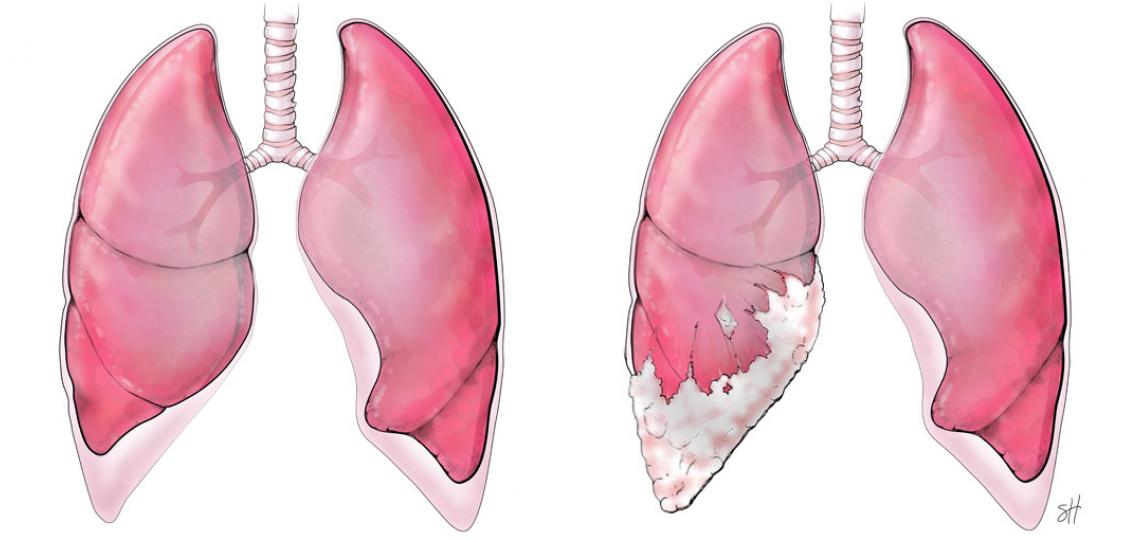Multidisciplinary Team and Personalized Treatment
The Mesothelioma Treatment Center located at the Baylor Medicine Lung Institute is recognized worldwide, as a leading-edge center for the diagnosis, treatment, and research of malignant mesothelioma.
Our multidisciplinary team of surgeons, oncologists, radiologists, pathologists and intensivists specifically tailor for you a comprehensive personalized treatment plan that will target your disease. With our cutting-edge clinical, biomedical and basic research programs, we strive to integrate the most innovative and up-to-date understanding of mesothelioma into your treatment plan. In addition, our medical staff together with the members of our support program will make every effort to address any special need you may have and will make sure that you and your family are involved and comfortable with every step of your diagnosis, treatment and follow-up.
Mesothelioma Treatment Goals
Mesothelioma is an aggressive asbestos-related malignancy that originates from the cells (mesothelial cells) that compose the thin tissue (serosa) that lines the walls and organs of the lungs and abdomen.
Although mesothelioma typically has a dire prognosis, physicians and researchers at the Mesothelioma Treatment Center are coming up with increasingly sophisticated ways to diagnose and treat this disease.
Treatment at the Mesothelioma Treatment Center is often multimodal and typically involves surgery to remove any tumor visible to the naked eye in combination with chemotherapy and immunotherapy. Members of our team have refined surgical techniques and incorporated new treatment modalities to improve outcomes for mesothelioma patients.
Personalized Genetic and Immune Based Therapies
When you are evaluated at the Mesothelioma Treatment Center, tissue from your tumor and blood will be analyzed for the expression of distinct genes and immune markers to comprehensively evaluate what specific therapies would work better in your case.
Our panel of markers and clinical trials is expanding at a steady pace and will provide you with access to the most advanced treatment options available.
Facts About Mesothelioma
Malignant mesothelioma is a type of cancer that affects the cells of the mesothelium.
What is the mesothelium?
The mesothelium is a membrane that lines and protects organs in the chest and in the abdominal cavity. The mesothelium has different names depending on the organs it surrounds:
- The pleura lines the lungs.
- The peritoneum surrounds the organs within the abdominal cavity.
- The pericardium envelops the heart.
- The tunica vaginalis coats the testicles.
Diffuse pleural mesothelioma is a malignant or cancerous tumor of the pleura which is the mesothelium that surrounds the lungs. About two of every three mesothelioma cases are pleural mesothelioma. Most of the remaining cases are mesotheliomas of the peritoneum surrounding organs in the abdominal cavity. Mesotheliomas of the membranes that surround the heart or the testicles are very rare.
Mesothelioma affects over 2,000 people a year in the U.S.; before 2030, an estimated 300,000 cases will be diagnosed. Epidemiological studies predict that approximately 250,000 Europeans will develop mesothelioma in the next few decades.
As the malignant cells grow, the pleura thickens and presses on the lungs. These changes in the pleura can make breathing difficult and may possibly cause chest pain. Without treatment, most patients will die from mesothelioma within 4 to 12 months from the time of diagnosis. The most common causes of death are respiratory failure or pneumonia. In about one of every three patients, a small bowel obstruction develops as a result of tumor that has spread to the abdomen. About 1 in 10 patients die of cardiac complications when the tumor invades the pericardium and the heart.
The illustration on the left shows a pair of healthy lungs. In the illustration on the right, the left lung is affected with malignant pleural mesothelioma, a cancerous tumor of the pleura.
Subtypes of Mesothelioma and Prognosis
Three subtypes of mesothelioma have been identified according to microscopic appearance:
- Epithelial - associated with the best prognosis or outcome
- Sarcomatoid
- Mixed types
Other factors that may predict a favorable outcome are:
- Younger age
- Good performance status
- Early-stage disease
- Lack of chest pain at diagnosis
Risk Factors
Asbestos. Asbestos is a heat-resistant mineral used in fire-resistant and insulating materials. Exposure to asbestos is the highest risk factor for developing mesothelioma. Between 50 percent and 80 percent of patients diagnosed with mesothelioma are aware of exposure to asbestos at some point in their lives.
Mesothelioma affects more men than women; however, the demographics may be changing and more women have been diagnosed recently. Men were historically more likely to work in industrial settings in which asbestos was present. Now, asbestos remains in many building products and can lead to exposure in a variety of settings.
Radiation. Radiation is another risk factor associated with mesothelioma. Radiation-induced mesothelioma appears to have the same prognosis as asbestos-related mesothelioma and usually occurs in patients treated at a young age with radiation to the chest.








 Credit
Credit
